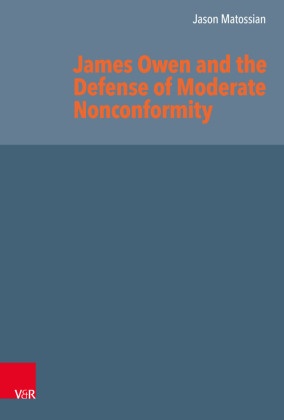James Owen and the Defense of Moderate Nonconformity - Dissertationsschrift
| Verlag | Vandenhoeck & Ruprecht |
| Auflage | 2022 |
| Seiten | 166 |
| Format | 16,0 x 23,5 x 1,6 cm |
| Gewicht | 417 g |
| Artikeltyp | Englisches Buch |
| Reihe | Reformed Historical Theology Volume 071, Part |
| ISBN-10 | 3525560486 |
| EAN | 9783525560488 |
| Bestell-Nr | 52556048A |
Moderation and unity are missing in much of today's theological discourse. 17th-century moderate Nonconformists, like James Owen, sought Christian unity without uniformity. Matossian introduces Owen's Protestant ecumenism and key principles of moderation.
A leading voice for moderate Nonconformity
The period of Revolution and Toleration in England was filled with rapid change, political uncertainty, and ecclesiastical volatility. Still recovering from the strife of Civil War and a divisive Restoration, the relationship between the Church of England and Nonconformists remained deeply strained. Although Dissenters were granted the right to gather for worship under Toleration, their legitimacy was regularly challenged. Within this context, a variety of significant controversies arose in which James Owen, a Welsh Presbyterian minister, played a prominent role and was a leading voice for moderate Nonconformity.Along with a group of moderate Nonconformist friends like Edmund Calamy, Philip and Matthew Henry, and Francis Tallents, Owen defended a version of Protestant ecumenism. This was a theological conviction that (1) the unity of the Protestant Church was indispensable and (2) this unity was to be found in agreement on essential doctrines, not in sharing ecclesiastical structu res. Owen, along with his associates, defended the Dissenters' separation from the Church of England as biblically sanctioned and at the same time emphasized that such separation was not schismatic.Owen's clear, biblically articulate, and historically informed writing made his contribution to the period of Toleration significant and influential.
A leading voice for moderate Nonconformity
The period of Revolution and Toleration in England was filled with rapid change, political uncertainty, and ecclesiastical volatility. Still recovering from the strife of Civil War and a divisive Restoration, the relationship between the Church of England and Nonconformists remained deeply strained. Although Dissenters were granted the right to gather for worship under Toleration, their legitimacy was regularly challenged. Within this context, a variety of significant controversies arose in which James Owen, a Welsh Presbyterian minister, played a prominent role and was a leading voice for moderate Nonconformity.Along with a group of moderate Nonconformist friends like Edmund Calamy, Philip and Matthew Henry, and Francis Tallents, Owen defended a version of Protestant ecumenism. This was a theological conviction that (1) the unity of the Protestant Church was indispensable and (2) this unity was to be found in agreement on essential doctrines, not in sharing ecclesiastical structu res. Owen, along with his associates, defended the Dissenters' separation from the Church of England as biblically sanctioned and at the same time emphasized that such separation was not schismatic.Owen's clear, biblically articulate, and historically informed writing made his contribution to the period of Toleration significant and influential.

